‘Reform civil war’ and ‘arise Sir Becks’

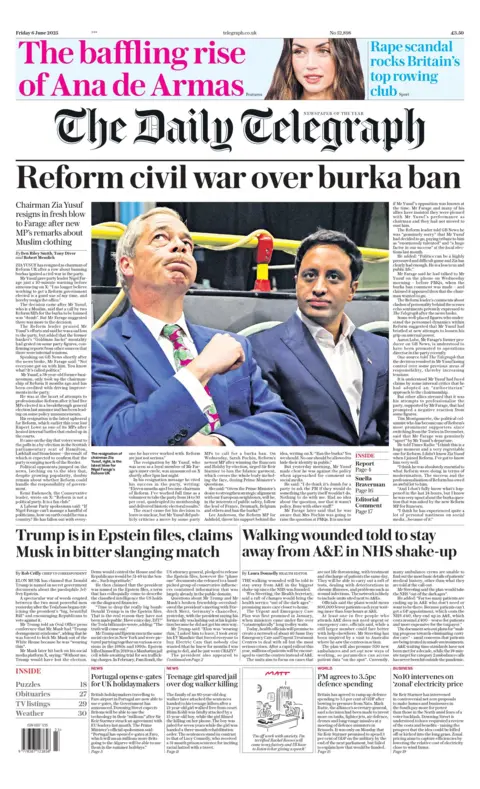


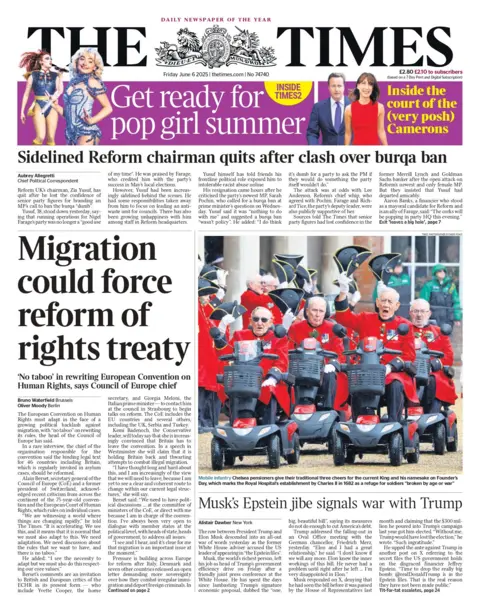
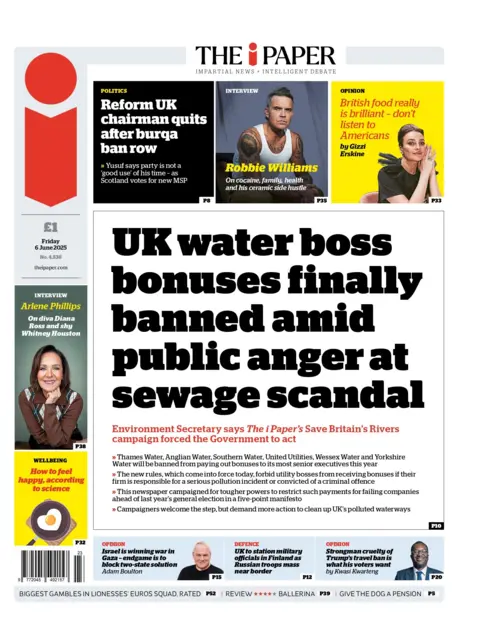






























The Education Department accuses the Ivy League school of violating the Civil Rights Act and calls for its accreditor to take action.
The United States Department of Education has notified Columbia University’s accreditor that the Ivy League school allegedly broke federal anti-discrimination laws.
In a statement on Wednesday, the Education Department’s Office for Civil Rights (OCR) and the Department of Health and Human Services (HHS) claimed that Columbia University had “acted with deliberate indifference towards the harassment of Jewish students”.
As a result, they said that Columbia violated the Civil Rights Act of 1964, which prohibits recipients of federal funding from discriminating on the basis of race, colour or national origin.
“Specifically, OCR and HHS OCR found that Columbia failed to meaningfully protect Jewish students against severe and pervasive harassment on Columbia’s campus and consequently denied these students’ equal access to educational opportunities to which they are entitled under the law,” the statement said.
It quoted Secretary of Education Linda McMahon, who accused Columbia University of ignoring the ongoing harassment of Jewish students on its campus since Israel’s war on Gaza began on October 7, 2023.
“This is not only immoral, but also unlawful,” McMahon said
She added that the accreditor, the Middle States Commission on Higher Education, has “an obligation to ensure member institutions abide by their standards”.
The commission is one of seven regional bodies that reviews colleges, universities and other institutions of higher education to ensure they meet the standards needed to grant degrees.
McMahon described accreditation institutions as the “gatekeepers of federal student aid” and explained that they decide which schools are eligible for student loans.
“We look forward to the Commission keeping the Department fully informed of actions taken to ensure Columbia’s compliance with accreditation standards including compliance with federal civil rights laws,” McMahon said.
The statement specified that the Education Department and HHS had come to their determination about Columbia University’s civil rights compliance on May 22.
The Ivy League school had been an epicentre for pro-Palestinian and anti-Israel student protest movements, with some of the first student encampments cropping up on its lawn in April 2024.
The university has remained in the news with arrests of high-profile student activists like Mahmoud Khalil in March and Mohsen Mahdawi in April.
Mahdawi has since been released, though he, like Khalil, continues to face deportation proceedings.
The administration of President Donald Trump has accused the demonstrators of creating unsafe conditions for Jewish students on campus, something the protest leaders have denied.
It reiterated that allegation in Wednesday’s statement, where it summed up the “noncompliance findings” that allegedly show Columbia at odds with civil rights law.
“The findings carefully document the hostile environment Jewish students at Columbia University have had to endure for over 19 months, disrupting their education, safety, and well-being,” said Anthony Archeval, acting director of the Office for Civil Rights at HHS, in the statement.
“We encourage Columbia University to work with us to come to an agreement that reflects meaningful changes that will truly protect Jewish students.”
The university did not immediately respond to a request by the Reuters news agency for comment.
The Trump administration and Columbia University were in negotiations over $400m in federal funding for the New York-based Ivy League school. Columbia agreed to a series of demands from the administration in a bid to keep the funds flowing, but the US government has not confirmed whether it will restore the contracts and grants that it paused.
In March, McMahon had said Columbia University was “on the right track” toward recovering its federal funding.
Just 40 countries representing 3.5 percent of the world’s population respect all civil liberties, a new study has found, warning that “democracy and human rights are under attack worldwide in a way we have not seen for decades.”
The Atlas of Civil Society report published by the German relief organisation Brot fur die Welt (Bread for the World) on Monday said only 284 million people living in “open” countries – including Austria, Estonia, the Scandinavian countries, New Zealand and Jamaica – enjoy protection of unrestricted civil rights and liberties.
The nongovernmental organisation defines a country as “open” if it allows people to form associations “without legal or practical barriers, demonstrate in public spaces, receive information and are allowed to disseminate it”.
Forty-two countries making up 11.1 percent of the world’s population are listed in a second category in which civil rights are classified as “impaired”. These include Germany, Slovakia, Argentina and the United States.
In these countries, the rights to freedom of assembly and expression are largely respected, but there are recorded violations.
“In contrast, 85 percent of the world’s population lives in countries where civil society is restricted, suppressed, or closed. This affects almost seven billion people,” the report found.
“Their governments severely restrict civil liberties and harass, arrest, or kill critical voices. This applies to 115 of 197 countries,” it added.
Several European countries appear in the “restricted” category, including Greece, the United Kingdom, Hungary and Ukraine.
Civil society is considered “oppressed” in 51 countries, including Algeria, Mexico and Turkey. In these countries, governments monitor, imprison or kill critics, and exercise censorship, according to the data.
Finally, Russia and 28 other countries are classified as “closed” and
characterised by an “atmosphere of fear”. Criticism of the government
or regime in these countries is severely punished.
Brot fur die Welt drew on data collected by the Civicus network of civil society organisations worldwide for its annual report covering 197 countries and territories.
Nine countries improved their freedom of expression ratings last year, including Jamaica, Japan, Slovenia, Trinidad and Tobago, Botswana, Fiji, Liberia, Poland and Bangladesh.
However, nine countries were downgraded from the previous year, including Georgia, Burkina Faso, Kenya, Peru, Ethiopia, Eswatini, the Netherlands, Mongolia and the Palestinian territory.
Dagmar Pruin, president of Brot fur die Welt, warned that “the rule of law, the separation of powers and protection against state arbitrariness are under threat or no longer exist in more and more countries.”
Norbert A. Schlei, key lawyer in the Kennedy and Johnson administrations who found legal underpinning for the 1962 blockade of Cuba, wrote landmark civil rights legislation and once waged a strong bid to replace an entrenched Republican California secretary of state, has died. He was 73.
Schlei died Thursday at an acute care hospital in Los Angeles of infections caused by long-term immobility, his wife, Joan, said Saturday. She said Schlei had been virtually unconscious since suffering a heart attack March 25, 2002, while jogging in Santa Monica.
Considered a legal wunderkind, Schlei was the Democratic candidate for the 57th California Assembly District in 1962 when he was tapped by President John F. Kennedy as an assistant attorney general in charge of the office of legal counsel.
At the time, Atty. Gen. Robert F. Kennedy, the president’s younger brother, quipped that Schlei — only 33 — had been named so there would finally be “someone younger” than he in the Justice Department.
But Schlei, who clerked for Supreme Court Justice John Harlan after graduating from Yale Law School, proved a scholarly asset to the Kennedys and later to President Lyndon B. Johnson and Atty. Gen. Nicolas Katzenbach during crises and in forging the landmark Kennedy-Johnson civil rights reforms.
Schlei was the principal draftsman of the Civil Rights Act of 1964, the Economic Opportunity Act of 1964, the Voting Rights Act of 1965 and the Immigration Reform Act of 1967.
“I felt I was lucky,” Schlei told the New York Times in 1995, “because I was able to turn what ability I had to something important.”
Schlei had barely moved into his quarters in August 1962 as head of the office of legal counsel just vacated by Katzenbach, when he was put to work. The University of Mississippi had refused to allow James Meredith, a black student, to enroll that fall, and Kennedy sent Schlei to Oxford, Miss., to get Meredith into the school.
Hardly a month later, as the Cuban Missile Crisis developed, Kennedy asked Schlei to study the legal basis for presidential action in connection with Cuba after U.S. surveillance confirmed that Russia was installing surface-to-air missile sites in the Communist island nation. Schlei responded with what became Kennedy’s October justification for a naval quarantine on all offensive military equipment being shipped to Cuba.
“It is our view,” he wrote, “that international law would permit use by the United States of relatively extreme measures, including various forms and degree of force, for the purpose of terminating or preventing the realization of such a threat to the peace and security of the Western Hemisphere.”
The lawyer supported the view with references to self-defense rights, the collective and multilateral security obligations of the U.S. and the 1934 Cuban-U.S. Treaty, which established U.S. rights for its naval base at Guantanamo.
Although Schlei had to abandon his bid for assemblyman to go to Washington (incumbent Republican Charles Conrad was reelected), he tried for election in California four years later when he ran for secretary of state.
Schlei handily defeated six others in the 1966 Democratic primary, polling nearly twice as many votes as were received by his nearest competitor.
He also collected more than 2.7 million votes, a remarkable tally for a Democratic statewide office seeker in that penultimate general election against Republican Frank M. Jordan, incumbent for 23 years and at the time the only Republican statewide officeholder. Nevertheless, Schlei lost the general election Nov. 10, 1966, as Jordan was swept to victory in the Ronald Reagan Republican landslide.
Schlei, a personable Democratic campaigner, was only yards from Robert Kennedy at Los Angeles’ Ambassador Hotel when Kennedy was fatally shot on the night of the California primary in 1968. He largely bowed out of politics after serving as a delegate to the Democratic National Convention that year in Chicago.
A highly successful trial and securities lawyer who represented such clients as Howard Hughes’ Summa Corp. in lengthy litigation brought by ousted Hughes executive Robert Maheu, Schlei himself was tried in a Florida federal courtroom in 1995.
The charges and their aftermath were a cloud on Schlei’s brilliant career.
Schlei was acquitted of eight counts, including wire and bank fraud and money laundering, but was convicted by a jury of conspiracy and securities fraud for purportedly helping five others sell $16 billion in fake Japanese government bonds from the mid-1980s to 1992.
He was sentenced to five years in federal prison and lost his license to practice law for 3 1/2 years. But he never went to prison, remaining free on appeal. The 11th Circuit Court of Appeals vacated the judgment and, in 1998, Schlei abandoned motions for a new trial to clear his name. Instead he agreed to a negotiated settlement of a year’s unsupervised probation on one misdemeanor count of conspiracy to possess counterfeit foreign securities, and resumed his law practice in L.A.
Joan Schlei said Saturday that Schlei had been completely exonerated after federal prosecutors conceded that there was a “possibility the instruments are valid” and that Schlei had been wrongly prosecuted.
Schlei maintained all along that he had done nothing illegal, and that prosecutors who issued charges against the others after a sting operation had added him only because of his high profile in Democratic and government circles to “get in the papers” and make the trial “newsworthy.”
At issue were bonds the Japanese government claimed were counterfeit and created by a forger they imprisoned in 1983. Schlei countered that the securities were legitimate, that they had been issued in 1983 by Japan’s minister of finance, Michio Watanabe, at the request of former Prime Minister Kakuei Tanaka after Tanaka left office in a bribery scandal. Schlei said he had never sold the securities and had simply tried to help about 30 clients purchase them with the understanding that the securities would be redeemable only if they could persuade a current Japanese government to honor them.
Among the highly prominent character witnesses who testified on Schlei’s behalf during the trial was key Republican U.S. Sen. Arlen Specter of Pennsylvania, who had known Schlei since they were students together at Yale.
Born Norbert Anthony Schlei on June 14, 1929, in Dayton, Ohio, Schlei grew up in meager financial circumstances, taking odd jobs delivering papers and groceries to help his family. He paid his way through Ohio State University as a waiter, but managed to graduate with honors in English literature and international relations and earned three varsity letters for golf.
He served as a Navy officer during the Korean War and later went to Yale Law, where he graduated first in his class and was editor of the Yale Law Journal. After a year clerking for Harlan, he moved to Los Angeles in 1957 to work for the prestigious law firm of O’Melveny and Myers.
In 1959, Schlei helped form the firm Greenberg, Shafton and Schlei where he remained until he went to the Justice Department in 1962. In later years, he was associated with different law firms, most notably the Wall Street firm of Hughes Hubbard & Reed from 1972 until 1989, whose Los Angeles office he established.
He was co-author of “Studies in World Public Order,” a book on international law published in 1961, and in 1962 wrote the book “State Regulation of Corporate Financial Practices.”
Schlei sat on the boards of several corporations involved in international real estate and securities. Long involved in real estate development, Schlei had begun in 1959 to represent Janss Corp., which developed Westwood Village and the Conejo Ranch area near Thousand Oaks.
In addition to his wife, the former Joan Masson, he is survived by three sons and three daughters from his earlier marriages to Jane Moore and to attorney Barbara Lindemann — William, Andrew, Bradford, Anne, Blake and Elizabeth; and four grandchildren. Two other sons, Graham and Norbert L. Schlei, preceded him in death.
Calling hours will be 4 p.m. to 8 p.m. Wednesday at Gates-Kingsley Funeral Home, 19th Street and Arizona Avenue, Santa Monica. Graveside services are planned for 11 a.m. April 29 at Forest Lawn Hollywood Hills.
His wife asked that memorial contributions be made to any of these organizations: Amnesty International, the American Heart Assn., the American Cancer Society, the ACLU or the Constitutional Rights Foundation.
Lawyers for the six victims say ‘historic’ court decision recognises the plight of survivors who demanded justice for decades.
A top Guatemalan court has sentenced three former paramilitaries to 40 years each in prison after they were found guilty of raping six Indigenous women between 1981 and 1983, one of the bloodiest periods of the Central American nation’s civil war.
The conviction and sentencing on Friday mark another significant step towards attaining justice for the Maya Achi Indigenous women, who were sexually abused by pro-government armed groups, during a period of extreme bloodshed between the military and left-wing rebels that left as many as 200,000 dead or missing.
Former Civil Self-Defence Patrol members Pedro Sanchez, Simeon Enriquez and Felix Tum were found guilty of crimes against humanity for sexually assaulting six members of the Maya Achi group, Judge Maria Eugenia Castellanos said.
“The women recognised the perpetrators, they recognised the places where the events took place. They were victims of crimes against humanity,” she said, praising the women’s bravery in coming to court to testify on repeated occasions.
“They are crimes of solitude that stigmatise the woman. It is not easy to speak of them,” the judge said.
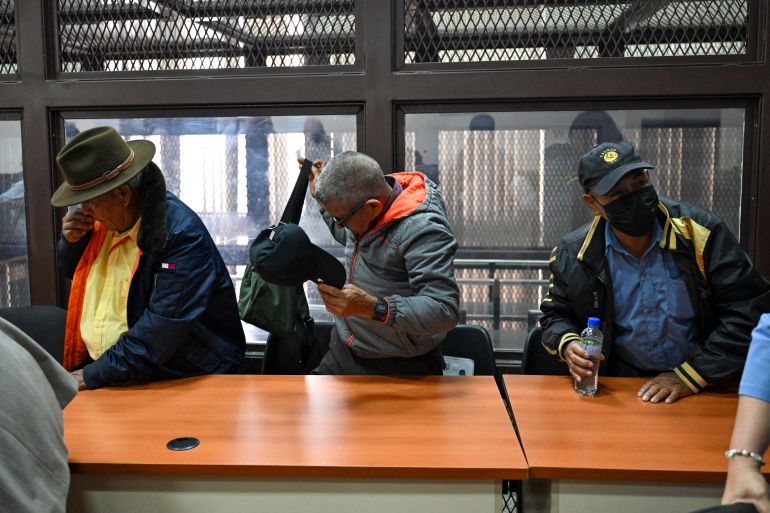
Indigenous lawyer Haydee Valey, who represented the women, said the sentence was “historic” because it finally recognised the struggle of civil war survivors who had demanded justice for decades.
Several Maya Achi women in the courtroom applauded at the end of the trial, where some dressed in traditional attire and others listened to the verdict through an interpreter.
One of the victims, a 62-year-old woman, told the AFP news agency she was “very happy” with the verdict.
Pedro Sanchez, one of the three men convicted, told the court before the sentencing, “I am innocent of what they are accusing me of.”
But Judge Marling Mayela Gonzalez Arrivillaga, another member of the all-women, three-panel court, said there was no doubt about the women’s testimony against the suspects.
The convictions were second in the Maya Achi women’s case against former military personnel and paramilitaries. The first trial, which took place in January 2022, saw five former paramilitaries sentenced to 30 years in prison.
Advocacy group Impunity Watch said the case “highlights how the Guatemalan army used sexual violence as a weapon of war against Indigenous women” during the civil conflict.
In 2016, a Guatemalan court sentenced two former military officers for holding 15 women from the Q’eqchi community, who are also of Maya origin, as sex slaves. Both officers were sentenced to a combined 360 years in prison.
A cadre of civil rights groups brought a lawsuit late Wednesday challenging Riverside County’s use of cash bail to detain people as they await trial, citing squalid conditions inside the county’s jails where dozens of inmates have died in recent years.
The class-action suit is the latest to challenge the legality of cash bail systems in California after a 2021 state Supreme Court ruling found it is unconstitutional to jail defendants solely because of their inability to pay their way out from behind bars.
“Every day, Riverside County imprisons people based on nothing more than their inability to pay an arbitrary, pre-set amount of cash that Defendants demand for their release,” attorneys for the civil rights groups argue in the 80-page complaint. “These individuals are not detained because they are too dangerous to release: The government would release them right away if they could pay. They are detained simply because they are too poor to purchase their freedom.”
The suit was brought by the Washington, D.C.-based nonprofit Civil Rights Corps, Public Justice in Oakland and several other law firms on behalf of two people incarcerated in Riverside County jails and two local faith leaders. It names as defendants the Riverside County Sheriff’s Department, Sheriff Chad Bianco, the Riverside County Superior Court system and the county.
Lt. Deirdre Vickers, a sheriff’s department spokesperson, said she could not comment on pending litigation, as did a representative for the county court system. The county executive’s office did not immediately respond to requests for comment.
While the suit argues money bail is unconstitutional across California and seeks an injunction ending its use, attorneys said they are focusing on Riverside County following a spate of deaths in the jails in 2022. That year, Riverside County recorded 18 inmate fatalities, the highest number in a decade.
The following year, California Atty. Gen. Rob Bonta, a Democrat, opened what remains an ongoing investigation into complaints about living conditions in the county jails and allegations that deputies use excessive force against detainees.
Inmate deaths have fallen since 2022. The county reported 13 jail fatalities in 2023 and six last year, according to Vickers.
Bianco — a law-and-order conservative who has joined a crowded field of Democrats to succeed Gov. Gavin Newsom in the 2026 election — has previously dismissed the state’s investigation into his jails as politically motivated. Bianco maintains the jail deaths, many of which authorities attribute to drug overdoses and suicides, are a reflection of the inmates’ life choices rather than a sign of any problem with the jail system.
“Every single one of these inmate deaths was out of anyone’s control,” Bianco said after news of the state investigation broke. “The fact of the matter is that they just happened to be in our custody.”
The cash bail system has deep roots in the U.S. as a means of pressuring defendants to show up for scheduled court appearances. Attend trial, and the sizable cash payments are returned to you or your family; skip court, and you forfeit your deposit.
Critics argue it effectively creates a two-tiered justice system, allowing wealthy defendants to pay their way out while awaiting trial, and leaving low-income defendants stuck behind bars. Proponents of eliminating the bail system contend that decisions about whether to jail defendants ahead of trial should be based on the severity of their crimes and the risk they pose to public safety, and not hinge on their income status.
Brian Hardingham, a senior attorney with Public Justice, said people sometimes spend days in jail awaiting their first court appearance, only for a prosecutor to decline to file a case presented by local police. That stint behind bars can have an outsize effect on people’s lives, especially if they are low-income, Hardingham said.
“You meet people with 6-month-old kids in jail who, if they’re lucky, there is a partner or a parent or someone who can watch their kids,” he said, adding that even a brief stretch in a county jail can result in people losing their job, vehicle or even their residence.
Supporters of the cash bail system, including many law enforcement groups, say that doing away with it would leave too many defendants free to potentially flee and re-offend, leading to crime spikes.
The issue grew increasingly controversial during the COVID-19 pandemic, when the virus spread with deadly consequences through the state’s jails and prisons. Los Angeles County instituted a zero-bail policy for most offenses in 2020, trying to reduce jail crowding at a time when the virus was spreading rapidly. That policy was rescinded in June 2022.
Despite concerns from police groups, a 2023 report to the L.A. County Board of Supervisors showed re-arrest and failure-to-appear rates remained relatively static among those freed pre-trial while the zero-bail policy was in place.
A similar lawsuit to the one filed against Riverside County prompted Los Angeles County court officials to revise their bail policies in 2023. Under the new system, the vast majority of defendants accused of misdemeanors or nonviolent felonies are now cited and released, or freed under specified conditions after a judge reviews their case. Defendants accused of serious offenses, including murder, manslaughter, rape and most types of assault, still face a stiff cash bail schedule.
Fears that the new system would result in a crime spike have not been borne out. Total crime in areas patrolled by the Los Angeles County Sheriff’s Department fell by about 2% in 2024, the first calendar year the reduced bail policy was in place, according to department data. The city of Los Angeles has seen significant decreases in the number of robberies, property crimes and aggravated assaults committed this year, as of mid-May, records show.
Given the 2021 state Supreme Court ruling and the changes in Los Angeles, Hardingham said he is hopeful other counties will shift their bail policies without having to engage in a court fight.
“We would hope that they would be willing to see the writing on the wall and make the changes that are necessary,” he said.
NEW YORK — The Trump administration is accusing Columbia University of violating the civil rights of Jewish students by “acting with deliberate indifference” toward what it describes as rampant antisemitism on campus.
The finding was announced late Thursday by the Health and Human Services Department, marking the latest blow for an Ivy League school already shaken by federal cutbacks and sustained government pressure to crack down on student speech.
It comes hours after the Department of Homeland Security said it would revoke Harvard University’s ability to enroll international students, a major escalation in the administration’s monthslong attack on higher education.
The civil rights division of HHS said it had found Columbia in violation of Title VI of the Civil Rights Act, which blocks federal funding recipients from discrimination based on race, color or national origin. That final category, the press release notes, includes “discrimination against individuals that is based on their actual or perceived Israeli or Jewish identity or ancestry.”
The announcement did not include new sanctions against Columbia, which is already facing $400 million in federal cuts by the Trump administration over its response to pro-Palestinian campus protests.
A spokesperson for Columbia said the university is currently in negotiations with the government about resolving its claims of antisemitism.
“We understand this finding is part of our ongoing discussions with the government,” the spokesperson said in an email. “Columbia is deeply committed to combatting antisemitism and all forms of harassment and discrimination on our campus.”
The civil rights investigation into Columbia was based on witness interviews, media reports and other sources, according to HHS. The findings were not made public. A spokesperson did not response to a request for further information.
“The findings carefully document the hostile environment Jewish students at Columbia University have had to endure for over 19 months, disrupting their education, safety, and well-being,” Anthony Archeval, acting director of the HHS civil rights office, said in a statement.
Last spring, Columbia became the epicenter of protests against the war in Gaza, spurring a national movement of campus demonstrations that demanded universities cut ties with Israel.
At the time, some Jewish students and faculty complained about being harassed during the demonstrations or ostracized because of their faith or their support of Israel.
Those who participated in Columbia’s protests, including some Jewish students, have said they are protesting Israel’s actions against Palestinians and have forcefully denied allegations of antisemitism.
Many have also accused the university of capitulating to the Trump administration’s demands — including placing its Middle East studies department under new leadership — at the expense of academic freedom and protecting foreign students.
At a commencement ceremony earlier this week, a speech by Columbia’s acting president, Claire Shipman, was met with loud boos by graduates and chants of “free Palestine.”
Offenhartz writes for the Associated Press.
The US will cut exports to Sudan and lines of government credit after determining banned weapons were used in the conflict between government forces and the RSF.
The United States will impose sanctions on Sudan after determining that the country’s military used chemical weapons last year while fighting against paramilitary forces.
“The United States calls on the Government of Sudan to cease all chemical weapons use and uphold its obligations” under the Chemical Weapons Convention, US Department of State spokesperson Tammy Bruce said in a statement on Thursday.
Bruce said the US Congress has been notified of the State Department’s decision, and sanctions will be imposed around June 6.
They will include restrictions on US exports to Sudan and a block on access to US government lines of credit. Bruce’s statement did not include further details about when and where the chemical weapons were used by Sudanese government forces.
The New York Times reported in January that government forces had used chemical weapons on at least two occasions in remote parts of Sudan against the paramilitary Rapid Support Forces (RSF). The report cited unnamed US officials who said the weapon may have been chlorine gas, which can lead to severe respiratory pain and death.
Sudan’s army and the RSF have been locked in a civil war since April 2023 following a power struggle between the two sides.
The conflict has created one of the world’s worst humanitarian crises and a famine across Sudan, killing thousands and displacing 13 million people.
The US has also previously accused the RSF and its allies of committing genocide, and sanctioned top leaders like the RSF head, General Mohamed Hamdan Dagalo.
In January, the US also sanctioned Sudan’s military chief and de facto head of state, Abdel Fattah al-Burhan, for refusing to participate in international peace talks.
Author Ibram X Kendi on what still needs to be learned about Malcolm X’s legacy and race in the United States.
A hundred years after the birth of Malcolm X, and in the shadow of a second Donald Trump presidency, Ibram X Kendi – author of the international bestseller How to Be an Antiracist – returns to the meaning of Malcolm’s legacy in his newest book. What does it reveal about where the US is now, and what still needs to be said about race in America?
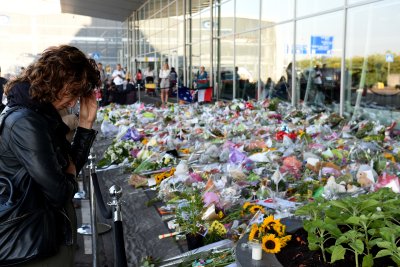
A woman pays her respects at a makeshift memorial for victims of downed Malaysia Airlines Flight MH-17 at Amsterdam’s Schiphol Airport on 24 July, 2014. The bodies of 40 victims were repatriated to the Netherlands six days after the tragedy aboard Royal Australian Air Force and Royal Netherlands Air Force transport aircraft. File Photo by Dan Himbrechts/EPA
May 13 (UPI) — Russia was responsible for the downing of a Malaysian Airlines passenger jet over eastern Ukraine that killed all 298 people on board in 2014, the U.N’s International Civil Aviation Organization ruled.
The ICAO Council voted that Russia had failed in its duties under the international laws of the sky in the shooting down of flight MH-17 after finding in favor of the Netherlands and Australia, both of which lost citizens in the tragedy, after they brought a case against Moscow, ICAO said in a news release Monday.
The council agreed that claims by the two countries were “well founded in fact and law,” saying Russia’s alleged conduct in the downing of the Boeing 777 aircraft by a surface-to-air-missile breached the Convention on International Civil Aviation, which mandates states “refrain from resorting to the use of weapons against civil aircraft in flight.”
ICAO said the finding had been reached after reviewing written submissions and oral hearings at multiple meetings of the 36-member-country governing council and that a formal document setting out the facts and points of law leading to its conclusion would be released at a future meeting.
Australian Foreign Minister Penny Wong, in a post on X, welcomed the win in what she said was Australia and the Netherlands’ “historic case” against Russia, saying it was a significant step in their fight for justice.
“We remain unwavering in our commitment to the pursuit of truth, justice and accountability for the victims and their loved ones,” she wrote.
Dutch Foreign Minister Caspar Veldkamp said the ruling was a strong signal to countries around the world that “states cannot violate international law with impunity.”
In a joint statement, the two countries said Russia must now take responsbility and “make reparations for its egregious conduct” as required under international law.
“Our thoughts are with the 298 people who lost their lives due to Russia’s actions, incuding 38 who called Australia home, their families and loved ones,” the statement said.
“While we cannot take away the grief of those left behind, we will continue to stand with them in that grief and pursue justice for this horrific act.”
MH-17 was en route from Amsterdam to Kuala Lumpur when it was shot down over Ukraine’s Donbas region, where Russian-backed separatists were fighting Ukrainian forces for control.
Britons, Belgians and Malaysians were also killed in the disaster but the majority, 196, were from the Netherlands.
In November 2022, a Dutch court trying two Russian nationals and a Ukrainian rebel fighter in absentia, found the trio guilty of murder and sentenced them to life in prison.
However, Russians Igor Girkin and Sergey Dubinskiy, and Ukrainian Leonid Kharchenko, who were fighting for the pro-Moscow Donetsk People’s Republic separatist movement at the time, remain free as the Netherlands was unable to extradite them.
A Joint Investigation Team made up of experts from five nations impacted by the diasaster — Australia, Belgium, the Netherlands, Ukraine and the United States — later ruled after a eight year probe that there was “concrete information” that Russian President Vladimir Putin likely approved the transfer of the BUK missile that brought down MH-17.
However, the team said that while they had evidence of Putin’s role in signing off on the transfer of the missile to separatists, it fell short of the prosecutorial standard of “complete and conclusive evidence.”